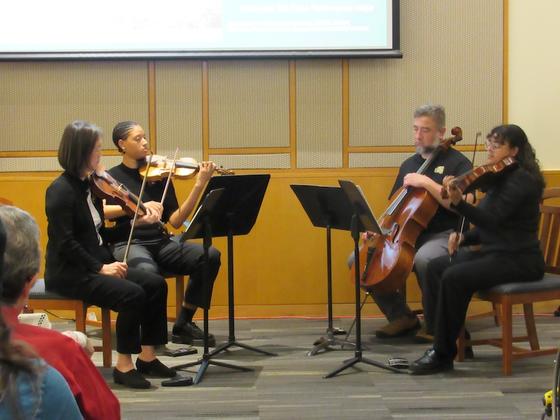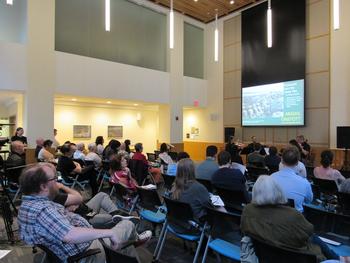George Mason University music professor June Huang sees connections between musical collaboration and peacebuilding, and she and her students demonstrate those connections with The Spheres Project, a strings faculty and student collaborative space established in 2021.
The project aims to foster connection and conversation between different communities and the name emphasizes its constant state of evolution.
“I looked at how creativity is at the heart of peacebuilding and experimented with this concept with five of my string pedagogy students. We started exploring compositions of these concepts and having rehearsals,” said Huang, who is the director of strings and associate professor of violin in the Dewberry School of Music.

Huang earned her master’s certificate in contemporary dispute resolution from the Carter School of Peace and Conflict Resolution in spring 2023. She was part of the very first cohort, which focused on principles of conflict resolution as they pertain to our domestic front.
“I started to draw connections between music and the peace building concepts I was learning about in class. Studying conflict resolution inspired me to listen with curiosity, not assumptions, which helps parties appreciate different perspectives and discover solutions,” said Huang.
The group’s most recent event, Spheres of Engagement was a collaboration between project, Dewberry School director of composition Andrea Reinkemeyer, and the University Libraries’ Special Collection Research Center (SCRC), where the students sourced images on which to base their compositions.
“Classical music tends to be grounded in tradition, so our interpretation of a piece of music is essentially imitation. On this project, we worked with new compositions that had never been performed before,” said Huang.
“The writing in some of these student compositions was not idiomatic, so the project challenged us to create musical interpretations and explore a wide range of possibilities. The connection between curiosity and creativity was a significant component for both composers and performers in this project,” she said.
Abigail Onstott is a junior composition major and one of the students who presented their original works for written for electronics or a string quartet at the Spheres of Engagement performance in April. Onstott’s composition was based on soldier-medic Gustav Klemp’s World War I archive collection.
“Getting to look through all the archives was the coolest thing ever for me because one of the areas I really like to focus on with music is culture, history, and politics, so this project was right up my alley,” said Onstott.
The students learned how to search through the collections as well as how to properly handle the archival materials from Mieko Palazzo, SCRC’s research services coordinator, and Cindy Badilla-Meléndez, George Mason’s music and media librarian.

The center also assisted Onstott in translating Klem’s letters from his native language, German, to English.
“Klemp was also a painter, so a lot of the things in the collection were actually artwork that he had done while he was overseas. As a composer that really fascinated me because it's not easy to work off of a physical artwork, but it's something that definitely helped with inspiration,” said Onstott.
Senior Stellan Hinz took an alternative path in the creative process, composing a fixed media piece using only electronics and human voices. Hinz gravitated toward a collection of letters that were sent to C-SPAN founder Brian Lamb.
“I wanted to explore compositionally using the human voice as the musical material. I got my roommates and some friends together to record a bunch of these letters and then chopped up the audio in order to bring voice to these letters,” said Hinz, a music composition major.
“You could see the progression of how people communicated [from the years 1809, 1978-2012], because there were some handwritten letters, some from a typewriter. It was from a very early stage of the world that we are now living in now where we're all connected and able to communicate all the time,” said Hinz, who plays the saxophone in George Mason’s Wind Symphony.
Another goal of this collaboration was to teach the students about the business side of composition. Students worked with their individual applied composition instructors to write project proposals, said Reinkemeyer, an associate professor in the Dewberry School.
“We tried to make the process very similar to applying for a grant,” said Reinkemeyer.
“The student composers loved working on this project, and I hope we get the work with The Spheres Project again soon,” Reinkemeyer said. “Our goal is to have events like this one every semester if we can. Music can interact with every discipline in surprising ways—data sonification, astrophysicists, biology. It's a really enriching place for connection.”
In This Story
